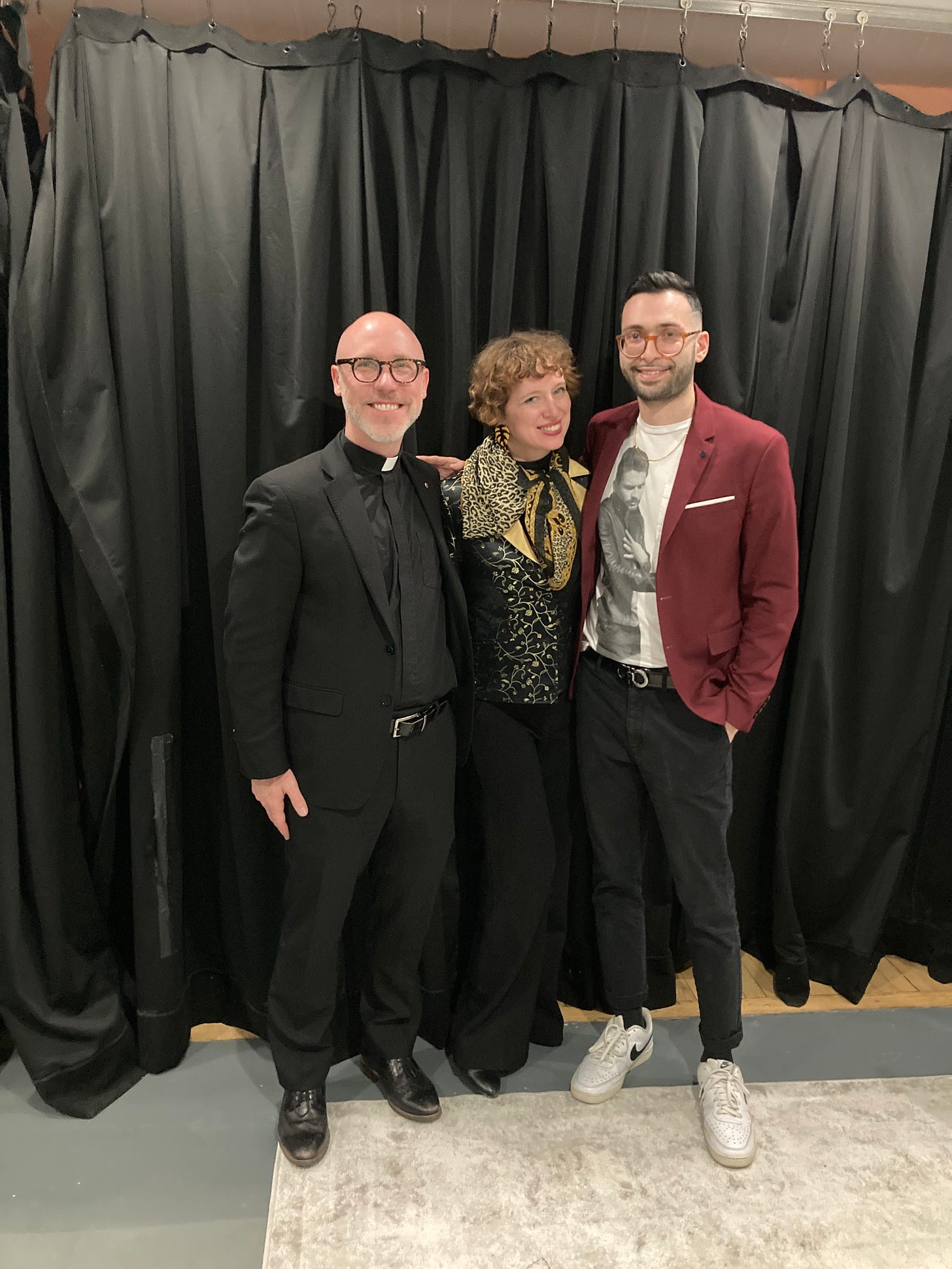New York Encounter
Thanks to all who came out to the New York Encounter back in February. Check out the recording of the Cracks in PoMo panel with
and Fr. Patrick Gilger SJ on Gen-Z and identity.You can also check out Emily Lehman’s interview with Tara after the Encounter, and the recordings of the rest of the panels. And please consider making a contribution to defray the costs of the Encounter.
Mencarelli: More hopeful than Houellebecq?
I recently reviewed the Italian writer Daniele Mencarelli’s novel The House of Gazes for RealClearBooks. Mencarelli’s exploration of human suffering and depravity echo Houellebecq, yet experiences it as a gateway to deeper meaning, rather than an indication of life’s meaninglessness.
Among the most divisive characters in today’s literary scene, Houellebecq repels some for his crudely pornographic sex scenes, his toying with sexism, xenophobia, and Islamophobia, and his largely nihilistic worldview. He attracts others for giving voice to the disillusionment brought on by the West’s nosedive into technocratic secularism. The lack of meaningful labor, the power of indifferent bureaucratic systems, and a neurotic fixation on diversity–which ends up having more of a homogenizing effect than one that appreciates the real differences between cultures, religions, and genders–has left many feeling utterly helpless. Houellebecq’s sex-addicted, politically incorrect protagonists legitimize his fans’ gripes with the current state of affairs.
Is Houellebecq merely a self-indulgent misanthrope whose moral weakness hinders him from finding a path toward the light as did Huysmans and his characters a century ago? Or is his nihilism merited? Perhaps there are indeed no vestiges of hope left for us to cling to in our atomized, deracinated age…and Houellebecq is simply unveiling a disappointing but very real fact.
While I have no authority to judge the state of another man’s soul, the recently translated debut novel of Italian writer Daniele Mencarelli both converges with Houellebecq’s bleak outlook while challenging whether it’s really as opaque as he imagines it to be.
…
As Pope Paul VI once insisted, “modern man listens more willingly to witnesses than to teachers.” Thus, if anyone is “converted” by Mencarelli’s hopefulness, it will be because his writing consists not of abstract arguments or ideological polemics, but of a vulnerable and frank recounting of a (profoundly modern) man’s experience. Above all, Mencarelli witnesses to the fact that the human desire for hope is so deeply rooted in us, that to completely snuff it out is an act nearly as laborious as it is in vain. This reality is so incontrovertible, so innate in the human soul that even Houellebecq in his final novel Aneantir cannot help but feel moved by seemingly superman acts of tenderness carried out by the broken human beings he meets.
Continue reading here. Also check out my review of Houellebecq’s Anneantir…and just a reminder, I am the sole owner of an English edition of the book (and no, I will not sell it to you).
Alt-Hagiographies
Our friends Marylou and Jerome Bongiorno, a Newark, NJ-based filmmaking couple, recently wrote in Cracks in PoMo about their experience directing two documentaries about the lives of Mothers Seton and Cabrini, which you can watch on PBS.
I reviewed the docs for America Magazine, citing how their rendering of the two saints’ stories echoes a new style of hagiography that’s becoming more and more popular, which isn’t afraid to reveal saints’ more human sides—including their moral and psychological fragility, thus making them more relatable to us everyday folk. I cited examples from biographies of Dorothy Day and Carlo Acutis and the e-girl hagiographizing of
(@simoneweilfooddiaries) and Red Scare.Read it here.
Last things…
- ’s piece for us on adjuncts in NYC:
The comparatively recent democratization of the university, and with it the profession, may, like most “democratizations,” be as easily called a secularization. The demotion of traditional canon—whether in the humanities, its most obvious case, or in the hard sciences in the dethroning of Newton’s physics in favor of relativity, or in math after Gödel’s incompleteness proofs and Cantor’s nuanced notions of infinity—that demotion from solid and sacred to mutable and profane requires a mutability in the university that, for most of its long history, it hasn’t had to muster.
…
But while that historical context provides some explanatory power for the rise of adjuncting in New York’s universities, and in the States generally, it also implies that over time, the adjuncts themselves become vanishingly more interchangeable and thus disposable, so it only shoves into sharper focus the dire situation of those who have become adjuncts, literally “additions,” linguistically and essentially peripheral. CUNY’s adjunct professors make, with a crowded teaching load of three bi-weekly courses per semester, well below the city’s median income. Many take in, after taxes, around the national adjunct average of $25,000 per year, which, with post-pandemic inflation, equates in the city to constant desperation.
The great William T. Cavanaugh on his latest book about idolatry:
What characterizes modernity is not disenchantment but the condition of having learned to describe ourselves as disenchanted. We have learned to use a whole set of binaries – enchanted/disenchanted, believers/nonbelievers, religious/secular – that don’t so much describe the world as it is but rather establish certain kinds of power relations, one of which is the superiority of the modern “secular” West over more benighted “religious” societies, both past and present. We like to congratulate ourselves on having left worship behind, but in fact we worship all kinds of bullshit. In the book I concentrate on nationalism and consumer goods, but there are plenty of other idolatries: race, technology, celebrity, etc.
…
A collector paid $3 million for the ball that Mark McGwire hit for his 70th homerun in 1998, despite the fact that it was physically identical to every other ball used that season. The physical object had been invested with an occult power; to possess it was worth enough money to feed and house and clothe a crowd of desperate people. The fantasy world in which consumer culture marinates us requires not just our rapt attention to products but also our lack of attention to the personal and social and environmental costs of the entire system that makes products appear on our doorsteps. This is indeed diabolical, in the etymological sense of that which separates us from the truth.
In Compact, Sohrab Ahmari features the stories of six Armenian women exiled out from Artsakh by the Azerbaijan’s military, giving a close up view of the scandalously ignored crisis that Simone Rizkallah wrote about for us last year.
Please consider signing up for a paid subscription to this page for more riveting content.
If you’re new to Cracks in Pomo, check out the About page or read up on our Essentials. Also check out our podcast on Spotify, Apple, and YouTube and follow us on Instagram and Twitter.
MASA tortilla chips by Ancient Crunch is offering our followers 10% off their order with the promo code CRACKSINPOSTMODERNITY. Click here to redeem.
photos taken by Jacob Anthony Amaro.






